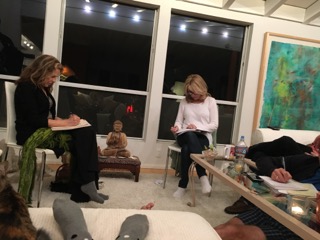I recently binged a Netflix series called Wild Wild Country about Indian guru Baghwan Shree Rajneesh or Osho. This cult (they balk at this label) of thousands took over a city in Oregon, acting with hostility to the residents of this previously sleepy town. It was shocking that Baghwan amassed wealth in the form of seventeen Rolls Royces and a huge collection of fine watches, including a gift of a million dollar diamond studded Rolex. I kid you not. All the while, his supposed spiritual aides engaged in criminal activity like poisoning and attempted murder.
Alleged growth sessions were prevalent as naked, rageful followers jumped on other and punched and fought as they expressed their unchecked anger. But what really got my attention was that each of the leaders and staff members were both good and bad, dark and light, humbled and arrogant, helpful and constricting. This is human nature.
I tell my writing students that a one-note character is a yawn because it’s inauthentic. A serial killer may walk an old lady across the street. Or a robber may give the homeless guy a few coins. Readers may not know exactly what feels wrong, but they know they’re bored and they’ll discard your book and go on to something else. On the other hand, when a readers sees the good and the bad in someone on the page, he or she will stay riveted because it feels real.
Baghwan had a stunning rise to fame until he lost contact with society and became a drug addict. At the same time, his teachings are fundamental to living a good life and staying conscious and loving. Baghwan’s infamous secretary, Sheela, began as a devoted follower until she was given more power than she could handle and she became corrupt. Isn’t that usually the case? She justified poisoning innocent Oregonians who opposed her and she talked one of her followers into attempting murder. She was given a 20 year jail sentence and now, she speaks about her past with great arrogance. She still believe she did the right thing to wake up the world and if they lost a few people along the way, what difference did that make? And still, she offered helpful discourses about the guru’s teachings.
This concept of leader and follower (guru and chela), of being good or bad, is prevalent in Indian society where they believe that without a living master, one can never wake up fully. But isn’t this a way to control the masses who would rather spin out into “blissful states” than take a look at the truth of what is going on around them?
One of the problems of such a caste system is that gurus need followers and followers want to be leaders. It’s a complicated hierarchy that in my opinion really doesn’t serve people. William Shakespeare said, Neither a borrower nor a lender be. I say, Neither a leader nor a follower be. In the end, no one can tell us how to live and how to be authentic. If we take the middle road as Buddhism encourages, being neither a full time leader or follower, we remain loyal to our own ethics, we admit our behavior, good and bad, and we devote our lives to being kind and compassionate. For me, it’s helpful to see that we are all the same as we place our focus on investigating and taming our own double-sided natures.


Recent Comments